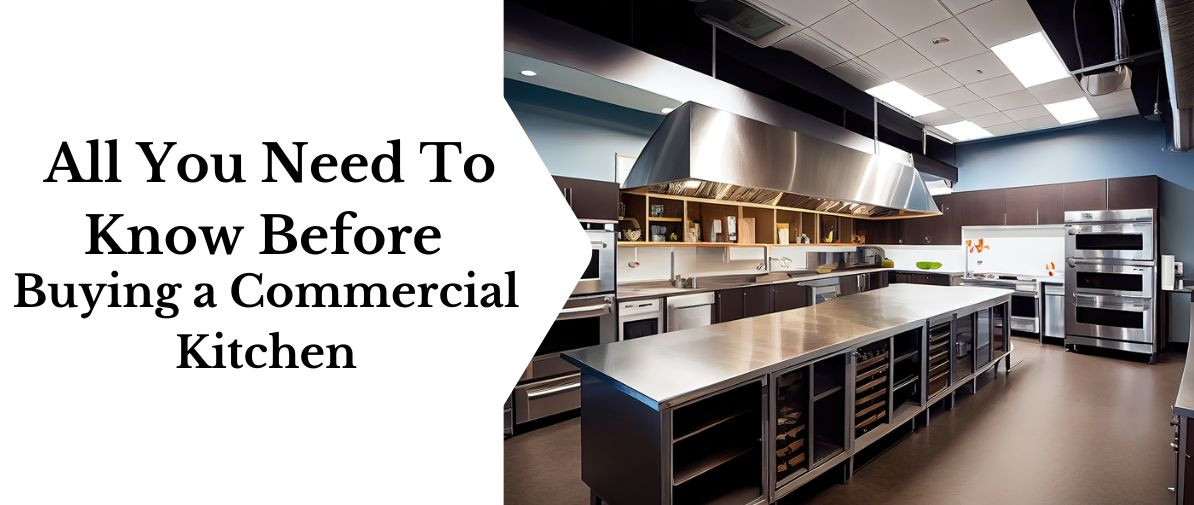
Rahul Jindal
To know more share your details



Purchasing a commercial kitchen is a crucial investment that necessitates careful planning and consideration. Whether you're starting a new eatery, expanding your catering business, or redesigning your current offices, making the right decisions is critical for long-term success. Here are some key factors to consider when buying a commercial kitchen:
A commercial kitchen is a kitchen in a home, restaurant, hotel, bar, or any other hospitality-type business whose main purpose is to prepare food for customers. The word 'commercial' tells us that these kitchens are designed for food to be sold, not for food that the person preparing it or people cook and eat.
Commercial kitchens are built to handle large volumes of orders, large turnovers, and different types of food in different preparation stages. Most kitchens have certain specialized equipment, as well as other built-in equipment to handle large food outputs and high-powered equipment that runs continuously.
The type of kitchen you need depends on the type of food you serve, the size of your business, the size of the staff working in the kitchen, and the order output. Here are some things to know when buying a commercial kitchen:
1- Understand nearby guidelines and codes.
Ontario has precise safety, security, and structural rules that all commercial kitchens must follow. Before making any purchases, learn about these principles to avoid costly remodels or legitimate difficulties later on.
Key points:
2- Assess your requirements:
Determine the specific requirements of your commercial to ensure that the kitchen you choose satisfies those requirements. Consider factors such as the type of cooking you will set up, the volume of food created, and any special equipment or hardware requirements.
Key points:
3- Area and available
The area of your commercial kitchen is basic to the outcome of your commercial. Consider the viability of your client base, providers, and transportation courses.
Key points:
4- Spending plan and supporting
Layout a Reasonable Financial Plan for Your Commercial Kitchen Buy, Including the Expenses of the Property, Equipment/Hardware, Redesigns, and Progressing Working Costs. Investigate supporting choices to assist with dealing with the expenses.
Key points:
5- Investigate the property.
Prior to settling any deal, make a careful investment in the property. This ought to incorporate really looking at the state of the structure, the usefulness of existing gear, and any potential support issues.
Key points:
6- Assess equipment and hardware needs.
The hardware in your commercial kitchen assumes a fundamental role in your tasks. Guarantee that the kitchen is furnished with superior-grade, productive machines that meet your commercial needs.
Key points:
7- Plan for Proficient Design and Plan
A proficient kitchen design can significantly impact productivity and security. Plan the design of your commercial kitchen to boost space and ensure a smooth work process.
Key points:
8- Think about energy proficiency and supportability.
Energy proficiency and sup-portability are progressively significant in commercial kitchens. Putting resources into energy-efficient equipment, hardware, and practices can decrease working expenses and your ecological impression.
Key points:
9- Ponder future development.
Who When purchasing a commercial kitchen, consider your drawn-out commercial objectives and how the space can accommodate future development. An adaptable space can save a lot in future remodels.
Key points:
10- Look for proficient guidance.
Exploring the intricacies of purchasing a commercial kitchen can be challenging. Look for guidance from experts like realtors, legal advisors, and commercial experts who have practical experience in commercial properties.
Key points:
Purchasing a commercial kitchen in Ontario is a huge venture that requires cautious preparation and thought. By grasping neighborhood guidelines, surveying your health, assessing gear, and looking for proficient encouragement, you can pursue informed choices that put your business in good shape. Make sure to anticipate future developments and focus on the energy profession to guarantee your commercial kitchen addresses your issues today and in the years to come. You can also contact a leading realtor of Homes for sale in Brampton Ontario can help you to find out the best commercial kitchen.
Also Read this Article-
What Is An Exclusive Listing And How It Works
How to prepare your home for sale on budget
Tips for an Effective Home Inspection